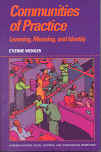
Formal Mentor Programs almost always have to goal of managing and transferring knowledge. This blog is an attempt to share the mentoring best practices used by well-run companies. These firms recognize that knowledge (or intellectual capital) is the source of their value creation, and that these assets need to be shared and expanded within the firm.
In this context, we have been thinking about the classic, Cultivating Communities of  Practice, by Etienne Wenger, Richard McDermott, and William M. Snyder. Communities of Practice come together around their shared interest and expertise. If the community is thriving, it increases the intellectual capital of the individuals and the organization. The book focuses on “aliveness,” a key characteristic of successful Communities of Practice, and how to encourage its development. Aliveness is driven by the personal interactions of the participants.
Practice, by Etienne Wenger, Richard McDermott, and William M. Snyder. Communities of Practice come together around their shared interest and expertise. If the community is thriving, it increases the intellectual capital of the individuals and the organization. The book focuses on “aliveness,” a key characteristic of successful Communities of Practice, and how to encourage its development. Aliveness is driven by the personal interactions of the participants.
Although developing a Community of Practice may be part of mentoring best practice, it can be challenging to get one started. "Community” is a human institution that, by definition, is spontaneous, self-directed and usually evolves naturally. Communities, unlike project teams or matrix reporting structures, need to invite the interaction – as this creates “aliveness”.
According to the authors, creating a Community of Practice in your organization means thinking along the lines of life-long learning, rather than traditional organizational design. The first step is to draw in potential members and to have them extend the community to their personal and professional network.
Creating the right environment to encourage the development of a Community of Practice, involves first building a robust culture of sharing knowledge across multiple locations and departments. This would describe most of the firms who believe they have strong mentoring cultures.
If your organization thinking about mentoring best practices or is thinking about how to create or improve its mentoring culture, we would like to talk to you. We have a number of tools, including many which are free.
Mentor Resources is the premier provider of tools for formal mentoring programs, using WisdomShare® an artificial-intelligence matching system. Our goal is to share mentoring best practices with each client is to help them develop mentoring programs which combining the best match with clear guidance and measurable goals which are strategically accretive to the organizations’ long-term goals.
Our clients include Fortune 1000 companies, professional associations, government departments and non-profit organizations and university alumni associations.